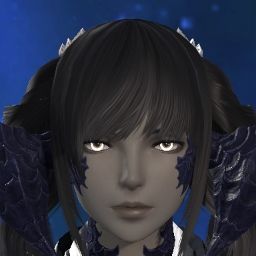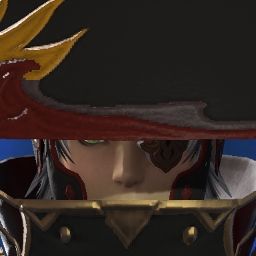Mobility =/= simplicity, immobility =/= complexity. Dunno what your point with all that is. Obviously there is "internal logic" to these perspectives as every single change the devs have made to BLM have been in line with pushing it toward playing a more rigid rotation. Which is just how every single job works in this game, not melee alone, but every single job. Even healers and tanks. Even raid encounters are scripted in the way mechanics come out, meaning the order of the optimal healer abilities and tank cooldowns is rigid.
I'm starting to think that you people just don't like FFXIV gameplay.
-
04-04-2025 03:52 PM #61(1)
-
04-04-2025 04:00 PM #62Player

- Join Date
- Aug 2021
- Location
- Gridania
- Posts
- 6,922
- Character
- Andreas Cestelle
- World
- Jenova
- Main Class
- Scholar Lv 100
They actually said they changed it because “ We anticipate that future battle design may cause difficulty with casting spells.” they said literally nothing about BLM’s supposed complexity
So the reason for the change has no internal logic across the classes because BLM wasn’t the limiting factor. Based on that what are these changes based on. You can’t claim these changes are good by default when the changes don’t even align with what the devs said they made the changes
And surprise surprise the 7.2 changes made PCT less rigid in a lot of its burst optimisation. So again if this change was about making classes more rigid they also apparently failed at that, how can changes like these be good if there is no logic behind their actions(7)
-
04-04-2025 04:41 PM #63Player

- Join Date
- Apr 2018
- Posts
- 1,466
- Character
- Carighan Maconar
- World
- Zodiark
- Main Class
- Paladin Lv 100
It's really frustrating that people in FFXIV see simplicity as a bad thing, when they should see shallowness as that. The ideal class has extreme simplicity (say, 5-10 buttons!), but is deep in what it derives from that. For extreme examples of this design look to the various classes in many roguelikes or look to how your weapon(s) utterly change how you approach the game in something like Dead Cells, despite only need one controller-face of buttons to play. Depth is staggering, despite extreme simplicity of design. FFXIV is usually the opposite. Our classes are highly complex, with lots of buttons that all mostly do the same thing ("Deal X potency of damage"), some have years of additive individually tiny blips of mechanics piled on top (e.g. Enochian timer, Paradox proc, Thunder proc, Umbral Ice, etc etc), and yet achieve exactly 0 depth with that as all of this has a fully static solution.
Executing that solution well still feels great of course. Sure. Honing an individually mindless craft is still a commendable achievement. But from a game design perspective it's... not good.
Is new BLM any better in depth? Well, no. It's trivially more flexible, but not in a way that matters.
Is it any worse though? No, it removes some complexity that did nothing for the gameplay.
The frustration is understandable though in the context of equating complexity to depth. Sure. But I really think people need to introspect and figure out why they value complexity, something that is supposed to be a net-negative in gameplay design.(2)
-
04-04-2025 05:24 PM #64
In my experience "simple" and "shallow" are pretty much just conflated terms. People complaining about "simple" jobs are complaining about exactly what you're talking about: a relatively static, "correct" answer that you bring into the vast majority of encounters. Whenever I see someone talking about "SMN is a simple job", that's usually what they mean.
Respectfully I disagree. Back in Endwalker it felt like I had a huge branching tree of possible paths I could take through an encounter based on what resources I had, the state of my timer, and when I needed to move. Now it's just "oh it's movement time better hit Triplecast".
And just to pre-empt any "that was only non-standard, standard BLM is the same as ever" counterarguments: So what? Depth should be opt-in anyway, the same way that I can play Monster Hunter by chugging Mega Potions in between bouts of running up and hitting the monster directly in the face. Just because someone chose not to engage with it doesn't mean it wasn't there before and doesn't mean it's not gone now.(6)
-
04-04-2025 06:56 PM #65
what you dislike is what so many other players liked about BLM. Being able to plan out different rotations and adapting to encounters. Personally I dont get anything from simpler classes that take no time to understand and execute.
(5)
-
04-04-2025 09:59 PM #66
They didn't reduce the complexity though, they reduced the magnitude of punishment(not frequency). Non-standard was already gone for a long time and has nothing to do with the 7.2 changes. You still have to transpose between phases if you want to be optimal. I think they should remove the transpose button entirely personally and just replace it with umbral soul when it is unlocked, but I'll never be playing the game at a high or organized enough level for it to matter so I'll just keep disregarding transpose in fights. It's a clunky thing and I don't enjoy it. You're actively encouraged by the job design to not transpose, yet it is optimal to transpose even though it feels way less fluid to transpose. If it were up to me, fire 3 proc from paradox and faster casted blizz 3 would be the way BLM went from phase to phase, but it's not up to me. Feels like some vestigial part of ARR left in the game, but it is what it is.
The 7.2 PCT changes are likely just a mistake, there's no way they wanted players to use regular abilities in lieu of motifs. That's called human error. The BLM changes suggest nothing of the sort and just bring the job in line with every other job: you fail to keep GCD rolling you lose potency, you fail to use a CD when it comes up you drift and lose potency. No other job gets absolutely restarted from zero as if they died mid-fight when they failed their rotation from having to focus on mechanics. It's to the point where it's like BLM players pre-7.2 were just masochistic weirdos and they can only enjoy the game if it is inanely punishing. Or they want to be praised or feel special for being able to stay on top of the ball. It's still the same thing, you just don't get punished to the same magnitude. Instead, you get punished to the same magnitude as other jobs. That's called balance.
I agree and it's why I often bring up from software games. They make much more meaningful and engaging difficulty than the FFXIV team does despite only being 2-3 button games at their core. You could literally win at the hardest fights in from software games on a NES controller if the dpad did left joystick inputs.
I am half and half, I find the rotations in this game to be too complicated and find it takes away from the content design, but I also feel like I want it to be maintain a degree of intricacy to the rotational flow. I can appreciate the intention of having static scripted rotations, because it feels good to become fluent at repeating them and maintaining track of where you are in them despite the encounters always having a different rhythm to their mechanics and the movement within them. Personally I'd rather have jobs even more simplified and straightforward, but I don't want it taken too far. There is a goldilocks level of complexity.
I also think the game should have jobs that cater to your interests in being more RNG and more variable in their rotations, but I don't think every job should go that direction and I don't want the scripted rotations to go away. To me it feels like learning different pieces of music or something. The rotations feel iconic and meaningful, and it feels really good to execute fluently. Just, too much rotational demand and the encounters become too simple. It goes the other way too, too much encounter complexity with an overly complex rotation, and it just feels overwhelming and annoying. People seem to really understate how much practice you have to put in to become fluent at any rotation in this game. It's insulting to suggest that even SMN is simple to execute during an encounter. Both dismissive of the amount of effort people put in to learning to be fluent, and insulting to people who approach it as a beginner. But that's the mmo ego. The core audience no-lifes these games and acts like it all comes naturally. On top of this they constantly read online guides and practice at target dummies. I just like playing games personally, it's not engaging to me to spend hours at a target dummy.(1)Last edited by HikariKurosawa; 04-04-2025 at 10:09 PM.
-
04-05-2025 06:52 PM #67Player

- Join Date
- Mar 2015
- Posts
- 797
- Character
- Arilaya Syldove
- World
- Brynhildr
- Main Class
- Black Mage Lv 100
And the odd weird BLM who has followed the class since ARR and knows that the devs never intended it to be flexible. But did intend it to be difficult to plan movement. I love movement planning. My favorite fights involved being a BLM and slidecasting near pixel perfect precision, or finding the one spot on the map I can safely stand to not need to move for the water blast in O6S, and be able to reliably and consistently stand there.
Hell, my strength as a player is fight knowledge and memorization, and I love learning the mechanics and preplanning them, moving very slowly over time to get to a spot with slidecasting.
Which is a big part why EW and DT has, in my opinion, some of the worst fight design the game has ever had. There is no planning, there is no prepositioning. There is only constant reaction to high-pace mechanics, forcing classes like BLM to lose the very thing that made it truly fun to begin with.(3)
-
04-06-2025 12:22 AM #68
-
04-06-2025 11:29 PM #69
-
04-07-2025 02:40 AM #70Player

- Join Date
- May 2015
- Posts
- 767
- Character
- Saphir Amariyo
- World
- Brynhildr
- Main Class
- Thaumaturge Lv 40
It's difficult to just pick one thing to take back from old BLM. I totally agree that the long cast time interaction with instants was interesting, though with the repetitive nature of encounters I would usually use instants on cooldown for DPS. Randomized fights would have really made triplecast and swiftcast shine, though even with scripted fights there would be some occasions where I'd have to decide between mobility or going for damage and figuring something out to keep casts rolling during boss mechanics. The lack of the timer is what I feel the most. I've even gotten lost in my rotation without it because there is no planning beyond checking 1-2 GCD's ahead to make sure you're not overcapping resources anymore. It's so easy to zone out.
Simplicity doesn't have to be bad, but I don't think it's good either and I wouldn't label extreme simplicity as an ideal of class design. Complexity by itself can be fun and I think there has to be some level of complexity somewhere to make an activity interesting once the novelty is gone. The complexity scale can also be a differentiating factor between classes. A class that is simple to play can feel different from one that is complex just as a slow class can feel different from a fast one. If everything is kept simple, you lose that flavor.
I can understand the view of FF14 as an example of complexity for complexity's sake and I agree that when that happens complexity has gone too far. Black Mage absolutely wasn't that though. If anything I've always considered it one of the simpler jobs. The timer wasn't there to make things difficult, it was there to make the really repetitive button pressing more engaging. Without the timer you're pressing Fire IV unless you need to press something else, and you don't have to think about any of it too much.Our classes are highly complex, with lots of buttons that all mostly do the same thing ("Deal X potency of damage"), some have years of additive individually tiny blips of mechanics piled on top (e.g. Enochian timer, Paradox proc, Thunder proc, Umbral Ice, etc etc), and yet achieve exactly 0 depth with that as all of this has a fully static solution.
Since class and encounter design are linked I wouldn't dismiss different concepts for Black Mage outright, but I do feel that with the current encounter design, job complexity is needed or the game is dull.(2)




 Reply With Quote
Reply With Quote













